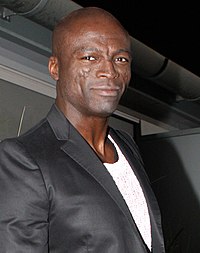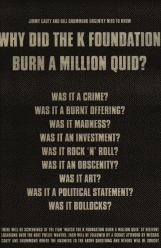
K Foundation Burn a Million Quid was a work of performance art executed and filmed on 23 August 1994 in which the K Foundation, an art duo consisting of Bill Drummond and Jimmy Cauty, burned £1 million in the back of a disused boathouse on the Ardfin Estate on the Scottish island of Jura. The money represented the bulk of the K Foundation's funds that had been previously earned by Drummond and Cauty as the KLF.

William Ernest Drummond is a Scottish artist, musician, writer, and record producer. He was a co-founder of the late-1980s avant-garde pop group the KLF and its 1990s media-manipulating successor, the K Foundation, with which he burned £1 million in 1994.
The 1994 K Foundation award was an award given by the K Foundation to the "worst artist of the year". The shortlist for the £40,000 K Foundation award was identical to the shortlist for the well-established but controversial £20,000 Turner Prize for the best British contemporary artist. On the evening of 23 November 1993, Rachel Whiteread was presented with the 1993 Turner Prize inside London's Tate Gallery, and the 1994 K Foundation award on the street outside.

The White Room is the fourth and final studio album by British electronic music group the KLF, released on 4 March 1991. The album features versions of the band's hit singles, including "What Time Is Love?", "3 a.m. Eternal", and "Last Train to Trancentral".
The Black Room is an unfinished studio album recorded by the Justified Ancients of Mu Mu, intended to be the follow-up to their KLF album The White Room.

The K Foundation was an art foundation set up by Jimmy Cauty and Bill Drummond, formerly of The KLF, in 1993, following their 'retirement' from the music industry. The Foundation served as an artistic outlet for the duo's post-retirement KLF income. Between 1993 and 1995, they spent this money in a number of ways, including on a series of Situationist-inspired press adverts and extravagant subversions in the art world, focusing in particular on the Turner Prize. Most notoriously, when their plans to use banknotes as part of a work of art fell through, they burned a million pounds in cash.
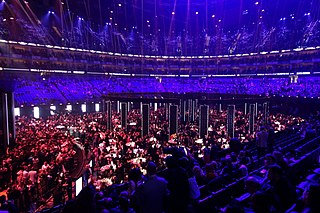
The BRIT Awards are the British Phonographic Industry's annual popular music awards. The name was originally a shortened form of "British", "Britain", or "Britannia", but subsequently became a backronym for British Record Industry Trusts Show. The awards were first held in 1977 and originated as an annual event in 1982 under the auspices of the British record industry's trade association, the BPI. In 1989, they were renamed The BRIT Awards. Mastercard has been the long-term sponsor of the event. In addition, an equivalent awards ceremony for classical music, called the Classic BRIT Awards, was held annually between 2000 and 2013, before being revived in 2018 but has not been held since.

Chill Out is the debut studio album by British electronic music group The KLF, released on 5 February 1990. It is an ambient-styled concept album featuring an extensive selection of samples, portraying a mythical night-time journey throughout the U.S. Gulf Coast states, beginning in Texas and ending in Louisiana. Chill Out was conceived as a continuous piece of music, with original KLF music interwoven with samples from songs by Elvis Presley, Fleetwood Mac, Acker Bilk, Van Halen, 808 State and field recordings of Tuvan throat singers.
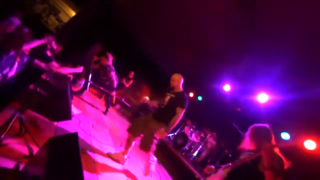
Extreme Noise Terror are a British extreme metal band formed in Ipswich, England in 1985 and one of the earliest and most influential crust bands. Noted for one of the earliest uses of dual vocalists in hardcore, and for recording a number of sessions for BBC Radio 1 DJ John Peel, the band started as crust punks and helped characterise the early, archetypal grindcore sound with highly political lyrics, fast guitars and tempos, and often very short songs.

"It's Grim Up North" is a song by The Justified Ancients of Mu Mu. The song was originally released as a limited edition "Club Mix" in December 1990 with Pete Wylie on vocals. A re-recorded version with Bill Drummond on vocals was released commercially in October 1991. These recordings were the first releases by Drummond and his creative partner Jimmy Cauty under the JAMs moniker since the 1988 compilation album Shag Times, and the last under that name; in the meantime they had operated as the Timelords and the KLF. The 1991 single release reached No. 10 on the UK Singles Chart and entered the top 10 in Denmark and Finland.

"3 a.m. Eternal" is a song by British acid house group the KLF, taken from their fourth and final studio album, The White Room (1991). Numerous versions of the song were released as singles between 1989 and 1992 by their label KLF Communications. In January 1991, an acid house pop version of the song became an international top ten hit single, reaching number-one on the UK Singles Chart, number two on the UK Dance Singles Chart and number five on the US Billboard Hot 100, and leading to the KLF becoming the internationally biggest-selling singles band of 1991.

1987 is the debut studio album by British electronic band the Justified Ancients of Mu Mu, later known as the KLF. 1987 was produced using extensive unauthorised samples that plagiarised a wide range of musical works, continuing a theme begun in the JAMs' debut single "All You Need Is Love". These samples provided a deliberately provocative backdrop for beatbox rhythms and cryptic, political raps.

"Last Train to Trancentral" is a song released, in different mixes, as a series of singles by British electronic band The KLF, including "Last Train to Trancentral ". A commercially successful single of April 1991, it reached number two on the UK Singles Chart, number one on the UK Dance Singles Chart and achieved international top ten placings. It is a central song within The KLF's work, and is distinctive for an uplifting string-synthesiser break.

"What Time Is Love?" is a song released, in different mixes, as a series of singles by the British electronic music band the KLF. It featured prominently and repeatedly in their output from 1988 to 1992 and, under the moniker of 2K, in 1997. In its original form, the track was an instrumental electronic dance anthem; subsequent reworkings, with vocals and additional instrumentation, yielded the international hit singles "What Time Is Love? " (1990), and "America: What Time Is Love?" (1991), which respectively reached number five and number four on the UK Singles Chart, and introduced the KLF to a mainstream international audience.
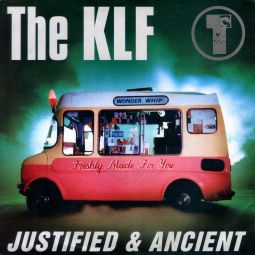
"Justified & Ancient" is a song by British band the KLF. It was featured on their 1991 studio album, The White Room, but its origins date back to the duo's debut album, 1987 .

"All You Need Is Love" is a song by the Justified Ancients of Mu Mu, independently released as their debut single on 9 March 1987. A politically topical song concerning the British media's AIDS furore, the track was initially given a 12" white label release because of its sampling of other records.

The KLF are a British electronic band who originated in Liverpool and London in the late 1980s. Scottish musician Bill Drummond and English musician Jimmy Cauty began by releasing hip hop-inspired and sample-heavy records as the JAMs. As the Timelords, they recorded the British number-one single "Doctorin' the Tardis", and documented the process of making a hit record in a book The Manual . As the KLF, Drummond and Cauty pioneered stadium house and, with their 1990 LP Chill Out, the ambient house genre. The KLF released a series of international hits on their own KLF Communications record label and became the biggest selling singles act in the world in 1991.

"Fuck the Millennium", sometimes spelled "***k the Millennium", is a protest song by the band 2K—Bill Drummond and Jimmy Cauty—better known as the Justified Ancients of Mu Mu or the KLF. The song was inspired musically by Jeremy Deller's "Acid Brass" project, where a traditional brass band plays acid house classics; these include the KLF's "What Time Is Love?". They were also inspired topically by the then-forthcoming end of the second millennium and the plans to celebrate it.
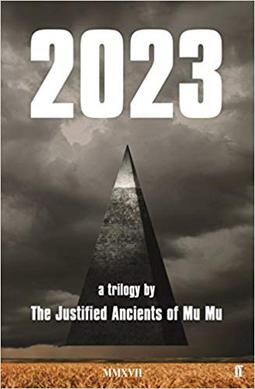
2023: A Trilogy is a book by Jimmy Cauty and Bill Drummond writing as The Justified Ancients of Mu Mu. The book was published in 2017, 23 years after the duo had burnt one million British pounds they earned in the music industry as The KLF.
